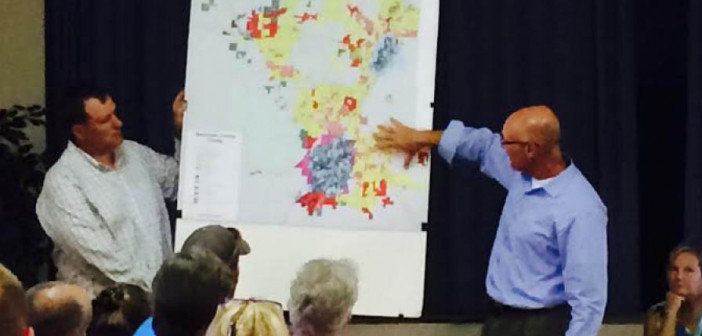(Photo above: Deschutes County Commissioner Tony DeBone and Community Development Director Nick Lelack)
Alfalfa, Oregon has been described as a potential future Napa Valley equivalent for marijuana growing with the ideal weather, climate, sun and soil to produce an excellent product. Recently several grow sites have established in the community of Alfalfa and many more are planning to establish soon. However, some community citizens have expressed resistance. Deschutes County will hold a meeting on August 12 to discuss the opportunity for a moratorium period.
They are not entirely upset by the growers themselves but rather the high level security built around the grow farms with tall fences and security cameras.
One particular facility, CannaTea, has been described as having a prison-type look in the middle of an otherwise quiet farming community. Another concern is the increased traffic, decline in property values and the people these businesses will attract to the area.
A meeting was held as a result at the Alfalfa Community Hall on Thursday, July 30 to discuss the issue. The meeting was organized by Shirley Morgan of Rhododendron, Oregon and billed itself as an effort to support “citizens for public safety, quality of life and property values.”
The meeting began with an informative video showing the negative effects of marijuana grow sites in Humbolt County. Next the session proceeded with a panel of speakers which included Detective Vandecamp of the Central Oregon Drug Traffic Team, Crook County District Attorney Daina Vitolins, Deschutes County Commissioner Tony DeBone, and Community Development Director Nick Lelack. Congressman Greg Walden sent an video presentation which was played at the event voicing his concerns about marijuana grow sites.
Some concerns raised by the panel included the number of dispensaries on Third Street in Bend, home grow sites and the problems they create for landlords and rentals, explosions as a result of hash oil, issues with overdoses and burglary and the impact cannabis has in bringing other drugs to an area.
Vitolins voiced her argument that there needs to be better control and regulation similar with alcohol and tobacco and a concern about underage use. Commissioner DeBone pointed out that Bend and the rural communities will approach the matter differently and that House Bill 3400 allows communities to ban marijuana if they choose.
He announced that a meeting will be held at the Deschutes County Commission Building at 10am on August 12 to discuss the opportunity for a moratorium period. One point he made is that this is new discussion for everybody and “we are all working through this together.” He explained that he wants to hear opinions to help better approach the situation.
Lelack provided information about the many questions his department has received from the community and made the point that if rural communities do not opt out then marijuana will be treated like a crop in farm use zones. The panel speakers were there to provide information, answer questions and were looking for input and feedback on the views of the community.
Morgan travels the nation training and assisting coalitions against the marijuana movement. She comes to small communities with problems or concerns but without the knowledge or ability to take the next step. Morgan says she provides the tools and education for the community while also connecting concerned citizens with their local government leaders so they know who to contact and have a voice to protect their way of life. Her mission is to provide a foundation of information so that even when she leaves there is a structure in place for the community to have momentum for the movement.
Morgan is a co-founder of the Mt. Hood Coalition against Drug Crime and founder of Oregonian’s Against Legalization of Marijuana. She owns and operates a website called protectoursociety.org which promotes healthy change in communities with a priority on assisting drug policy makers in providing “public safety, quality of life, and protection of property values.”
She hopes to achieve these goals by engaging, informing, and “developing common collaborative partnerships with drug policy makers” in an effort to protect officials and organizations who are committed to safe drug policies.
Pursuant to community concerns, Morgan argues that marijuana growing poses a threat to neighborhoods because it can potentially bring dangerous people to the area hoping to buy or steal from the growers. It is for this reason she is leading the charge to protect public safety, quality of life and property values. In addition, she argues that “marijuana businesses make bad neighbors” by emitting odors, attracting undesirable visitors, increasing criminal activity, and driving down property values.
After the panel made their statements the forum opened to public testimony and questions.
One Alfalfa resident expressed his dissatisfaction with the growers in the community stating that although there is a lot of excitement about Measure 91 there is another side to the story. One of his concerns is the selling of marijuana on the black market and to other states which would be occurring out of Alfalfa. However, he said that many people in Alfalfa do not altogether have a problem with marijuana growers but hope that they will be “discreet and shouldn’t have a security fortress in the middle of a neighborhood.”
With these security measures he and others are mostly concerned about the people the fence is trying to keep away.
Others in attendance defended the marijuana growers in the community and are openly accepting. Although the company does not intend to be at the center of debate, a CannaTea representative was present and when he stood to make a statement he received applause from those in attendance. CannaTea is very popular in the community and the representative said that he would give anyone with concerns his personal phone number for questions and a personal tour of the facility.
Several citizens spoke in defense of the company. The Alfalfa Store owner spoke up to say that CannaTea has been very good in communicating and being active in the community by attending, sponsoring and leading fundraising events. The farming couple that lives next door to CannaTea also have a very good relationship with the company as the two parties shook hands and spoke in a friendly manner after the meeting.
When asked, the neighbor said he is staying neutral and that although he has to see the facility from his property he is not all that bothered by the business. With regard to concerns about the tall fence, CannaTea has planted a row of trees on the perimeter which should soon make the controversial fence much more discreet.
Other Alfalfa area growers were in attendance and expressed their concern that the meeting was not as much a forum for conversation as it was an event to use carefully selected and one-sided figures to startle and concern the community about unrealistic issues. Many were vocal about their frustrations toward the panel selections and wanted more of a discussion with the government representatives to share their side of the story.
One person accused the panel of providing alarming statistics and stories to raise concern but claimed that the panel was not well represented with a grower or cannabis business representative to provide statistics and an argument in favor of grow operations.
Although not in attendance, CEO of CannaTea Rustin Kluge discussed the issue in a separate interview and said that he wants to be well respected locally and already has the respect of much of the community. His company aims to be an industry leader and he thinks Alfalfa is a great place to reach that goal. CannaTea wants to embrace the community and have the community embrace his company the same way they would someone who grows vineyard grapes or beer hops.
Kluge pointed out that cannabis in Alfalfa could be a major industrial boom and great for the local economy while also employing local citizens. He wants to help the community and hopes that once they are educated on his company and what they are doing it will be a cohesive relationship. He and his company offer to personally address any concerns of the community to offer a better understanding of the business.
Ultimately the verdict on marijuana farms and growing in Alfalfa remains to be seen. Many are in favor of opting for a moratorium period to better evaluate and plan while the state sorts through laws and regulations. Morgan has planted the seed for a movement by providing information and conversation between the community and government leaders.
However, businesses like CannaTea certainly have the potential to flourish and benefit the community in many ways which is the counter argument made by others. In approaching this debate the community will first need to determine whether or not to opt for a one year moratorium on the matter.






4 Comments
It is of marginal value to compare the proposed farming of marijuana in the Alfalfa area with grow areas in Humboldt County. Marijuana is not legal in California and everything associated with it’s production and distribution is a criminal activity. Marijuana is now legal in Oregon (with appropriate limits). It is likely, and certainly to be hoped, that its legality will gradually remove the criminal element from the picture. There is no reason why marijuana can’t become just another agricultural crop, as tobacco is in certain parts of the South.
Marijuana will never become just another crop as long as it is federally illegal.
The comparison of Humboldt County is very relevant in terms of how drug policy makers dealt with dealing with the infiltration of marijuana in their communities. The fact that it was legalized in Oregon is irrelevant, as the black market is well and healthy in Colorado, and we be well and healthy in Oregon.
You cannot apply market rules to illicit enterprises. States that “legalize” pot will never be able to “compete” with the cartels that pay no income taxes, business taxes, real estate taxes, and do not provide healthcare per Obamacare or any other benefits to its employees. Thus, the “legalization or regulation” of pot in the US will provide a windfall for the Mexican cartels who will have so much more to fight over. Moreover, the cartels will make more money under legalization or regulation than under prohibition. The reason is that with legalization, prices are set based on overhead and other government-imposed add-on’s. The cartels that do not have such deadweight costs will increase their prices to be just under the “legal” prices. That increase will be above fair market values because of artificially inflated pricing brought about by government intervention.
Marijuana cultivation and possession were legalized by Oregon voters. Having lost the battle in the court of public opinion and at the polls, the law enforcement community is now turning to scare tactics to frighten people in an effort to create local laws and rules that will interfere with state law. There is nothing inherently dangerous about the cultivation of marijuana in Central Oregon, and hopefully it will produce jobs and revenue for the community.
But it will loose the battle in court regarding federal law trumping state laws. Our elected officials have the responsibility to abide by both State and Federal laws.
As far as safety and projected scare tactics you try to diminish, perhaps reading the news will give you a glimpse of the real hazards of growing a federally illegal drug in our rural residential communities. There have been plenty of in-home invasions and fatal shootings at grow sites and at a medical marijuana grow in Portland just a couple of months ago a suspected gunman in Portland’s double homicide was hounding victims for medical marijuana and he shot all three growers point blank in the head and killed them all while a 13 week old baby slept in the next room.
I hardly call this a scare tactic, but rather a fact! I’ll take my life any day over the touting of bringing jobs and revenue to the community. The projected revenue will never outweigh the costs of addiction, highway safety, and potential murders in our communities.